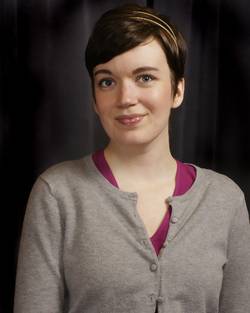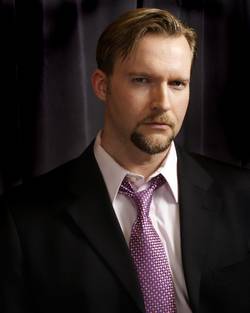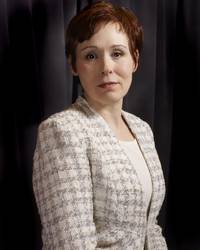 Gina Gionfriddo’s Becky Shaw is a story about what “good” is, what it means to actually be “good,” and what we give up when we seek it out. Becky Shaw is also a story about a family, the Slaters, and whether being in each others lives is good for them, or even desirable.
Gina Gionfriddo’s Becky Shaw is a story about what “good” is, what it means to actually be “good,” and what we give up when we seek it out. Becky Shaw is also a story about a family, the Slaters, and whether being in each others lives is good for them, or even desirable.
Our introduction to the Slaters takes place in a hotel room. It has been four months since the death of Suzanna and Max’s father, and they’re meeting with their mother to discuss the family’s financial situation. Max (who was adopted by the Slaters when he was young) and Susan Slater (the mother) have long since moved on with their lives, but Suzanna is still in mourning. She wears black; she doesn’t sleep well; and she’s even periodically suicidal. She leans very heavily on Max emotionally, and it’s completely clear from their conversation, and the affectionate way they relate to each other, that a strong bond exists between them.
In many ways, Suzanna and Max are exactly alike, and that’s the cause of their mutual attraction to — and simultaneous revulsion of — each other. They love each other deeply, but they also constantly disappoint and anger each other. One would almost think that they’re perfect for each other.
We don’t meet the play’s title character until very late in the first act. And at first, it’s uncertain what Becky Shaw’s role in this family’s drama will be. It is eight months later, and Suzanna has married Andrew, a gentle, fatherly office clerk (and wannabe writer) with a Messiah complex. He’s everything that Suzanna says she wants. Andrew works with Becky, and when he sets up a blind date between her and Max, Suzanna supports the idea.
But Becky is the last person with whom Max wants to spend time, and he’s surprised (and angered) that Suzanna would think otherwise. Becky is everything that Max hates about people, and especially women: awkward, meek, naive — the kind of woman who hangs an inspirational plaque on the wall of her living room. In other words, the complete opposite of Suzanna. Max is unimpressed and has no problem expressing that. But the worse he treats Becky, the more she thrives. We soon learn that Becky is Max’s equal in more ways than one.
Before seeing this play, I wasn’t familiar with Gina Gionfriddo, and she is a delightful discovery. The dialogue in Becky Shaw is sharp, funny, direct, harsh, and sometimes beautiful. It’s realistic in the sense that this is how many families would (should) talk to each other if only we’d just allow the thoughts in our heads to come out of our mouths. So it’s ironic that what most struck me about this story is what these characters don’t say to each other. It’s simply astonishing to watch a group of people who are so blunt and honest about so much of themselves stubbornly withhold the most important parts of whom they are and what they want (and this includes the deceased Mr. Slater).
And what all of them want is some aspect of The Good. Suzanna, so devastated by the death of her father, wants a man who is good, and not just to her, but wholly good; Max wants to be good for the Slaters (especially Suzanna) and, thus, worthy of his adoption; Andrew proudly thinks that he is good; Susan thinks that she’s found The Good Life; and in many ways, so does Becky. But all of them have different definitions of what “good” actually means. Hence, frustration. Hence, heartbreak.
I don’t see enough plays at The Station. I think that — in the 11 years that I’ve lived here — I’ve seen only a handful. I’ve been inexcusably negligent to both myself and this treasure of a theatre. This production of Becky Shaw — directed by Kay Bohannon Holley — is splendid, and has convinced me that I need to see more plays at The Station. Bradley Ashby’s Jadon Peck’s set direction is understated, yet perfectly designed and executed. Erin Miller’s costuming (from business suits to hipster casual to clumsy girlishness) is imaginative and intelligent. And I want a track list of the musical score!
Finally, the acting. Sometimes, it’s better to say things directly rather than flowery. The actors are superb. All five of them: superb. I don’t remember the last time I saw a production in which every performer was this remarkably good. Sure, I see lots of plays in which everyone onstage is — to varying degrees — talented and expert. This is Champaign-Urbana, after all. I experience quality theatre all of the time. But at Friday’s performance of Becky Shaw, every actor — all five of them — was equally impressive. Mathew Green (Max) and Lindsey Gates-Markel (Suzanna) have a chemistry that is electrifying. Watching them is like listening in on a private conversation. They are completely believable as lifelong friends whose relationship is complicated, hurtful, and cherished. And each are able to succeed in the difficult task of making complex, selfish, strong-willed people equally (and convincingly) caring, sincere — and most importantly — vulnerable. Their performances are flawless.


Mike Prosise (Andrew Porter) and Martha A. Mills (Becky) both possess an impressive skill: the ability to say something important with only a look, a smile, or a small movement. And I don’t mean simple emotions like pleasure or pain. I mean that they can communicate entire sentences, a mood, or a desire with just a glance or gesture. Prosise makes sure that we’ll never completely understand Andrew if we only concentrate on what he’s saying. And Mills can somehow emote risk, raw sexuality, and even menace — all while tearfully smiling at her protector, and her adversaries too.


 Finally, Joi Hoffsommer is perfect as Susan Slater. Hoffsommer’s role is deceptively difficult, I think. She’s not onstage as often as the rest of the cast, and when she is, she’s usually sharing some bit of wisdom, blowing off Max’s advice, or defending her choices in life. Susan is a woman who’s been around long enough, and experienced enough, that she can be firm, but also patient with all of these hurting, lost, young people, whether they’re arguing with her or with each other. The character of Susan, if not performed with care and intelligence, could easily come off as moralizing, or worse: berating. But this, thankfully, doesn’t happen with Hoffsommer.
Finally, Joi Hoffsommer is perfect as Susan Slater. Hoffsommer’s role is deceptively difficult, I think. She’s not onstage as often as the rest of the cast, and when she is, she’s usually sharing some bit of wisdom, blowing off Max’s advice, or defending her choices in life. Susan is a woman who’s been around long enough, and experienced enough, that she can be firm, but also patient with all of these hurting, lost, young people, whether they’re arguing with her or with each other. The character of Susan, if not performed with care and intelligence, could easily come off as moralizing, or worse: berating. But this, thankfully, doesn’t happen with Hoffsommer.
I’ve seen brilliant plays performed … not so well. And I’ve seen mediocre plays performed brilliantly. And I’ve seen almost everything in-between. Becky Shaw is a brilliant play that is being performed brilliantly. I was actually kind of nervous about writing this review. This production is so completely good that I didn’t think I’d be able to do it justice. Perhaps I haven’t. But even so, I strongly recommend that you see this play.
Future shows:
Station Theatre
Wednesday–Saturday, Mar. 7–10
Sunday, Mar. 11
Wednesday–Saturday, Mar. 14–17
All shows at 8:00 p.m.
Ticket prices:
Wednesday, Thursday, & Sunday: $10.00
Friday & Saturday: $15.00
All photos by Libby Abbott. Used with permission.








